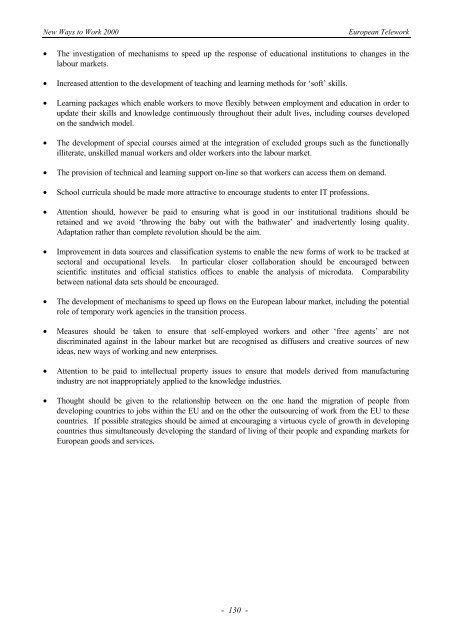eWORK 2000 - European Telework Week
eWORK 2000 - European Telework Week
eWORK 2000 - European Telework Week
- No tags were found...
Create successful ePaper yourself
Turn your PDF publications into a flip-book with our unique Google optimized e-Paper software.
New Ways to Work <strong>2000</strong><strong>European</strong> <strong>Telework</strong>• The investigation of mechanisms to speed up the response of educational institutions to changes in thelabour markets.• Increased attention to the development of teaching and learning methods for ‘soft’ skills.• Learning packages which enable workers to move flexibly between employment and education in order toupdate their skills and knowledge continuously throughout their adult lives, including courses developedon the sandwich model.• The development of special courses aimed at the integration of excluded groups such as the functionallyilliterate, unskilled manual workers and older workers into the labour market.• The provision of technical and learning support on-line so that workers can access them on demand.• School curricula should be made more attractive to encourage students to enter IT professions.• Attention should, however be paid to ensuring what is good in our institutional traditions should beretained and we avoid ‘throwing the baby out with the bathwater’ and inadvertently losing quality.Adaptation rather than complete revolution should be the aim.• Improvement in data sources and classification systems to enable the new forms of work to be tracked atsectoral and occupational levels. In particular closer collaboration should be encouraged betweenscientific institutes and official statistics offices to enable the analysis of microdata. Comparabilitybetween national data sets should be encouraged.• The development of mechanisms to speed up flows on the <strong>European</strong> labour market, including the potentialrole of temporary work agencies in the transition process.• Measures should be taken to ensure that self-employed workers and other ‘free agents’ are notdiscriminated against in the labour market but are recognised as diffusers and creative sources of newideas, new ways of working and new enterprises.• Attention to be paid to intellectual property issues to ensure that models derived from manufacturingindustry are not inappropriately applied to the knowledge industries.• Thought should be given to the relationship between on the one hand the migration of people fromdeveloping countries to jobs within the EU and on the other the outsourcing of work from the EU to thesecountries. If possible strategies should be aimed at encouraging a virtuous cycle of growth in developingcountries thus simultaneously developing the standard of living of their people and expanding markets for<strong>European</strong> goods and services.- 130 -








